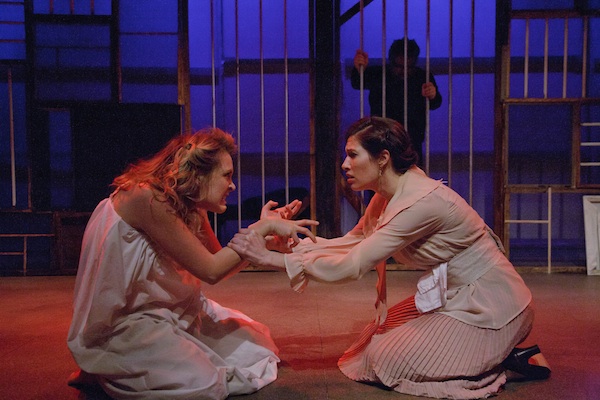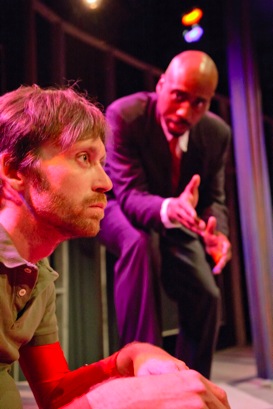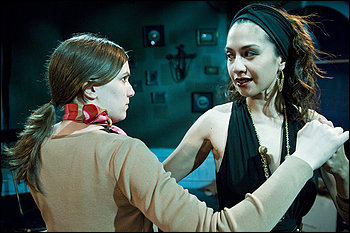|
Jacqueline Lawton: What was the first play that you ever directed? What did you learn from that experience that remains with you today?
Catherine Tripp: The first play that I really directed (as in a full length play) was The Passion, which I wrote. My theatre company was looking to do a version of the passion and my artistic partner was not comfortable directing a play about Jesus. I was, but I couldn’t find a script I liked. So I wrote one. I was studying theology at St Andrews University at the time, so it wasn’t an insane idea. What I learned from the experience is that a play is a growing thing. And the team that brings it together is really key. JL: Why did you decide to get into theatre? Was there someone or a particular show that inspired you? CT: I was an actor first. I was in the school play (Babes in Toyland- Mother Hubbard) in second grade. After that I was hooked. I went to New Orleans Center For the Creative Arts in high school and went on to study acting at the University of Southern California. After I left acting, I realized I didn’t want to leave theatre. I worked in a number of crew and producing roles- but once I directed I realized that was my true love. Though I still enjoy producing as well. JL: What kind of work do you do to pay the bills? How do you balance this work with your work as a director? CT: I am a film producer for a company that makes interactive training films. Before that I was in arts administration. I have always worked in the arts-which I think helps my directing process. I have a real appreciation for the business side and can appreciate the leadership skills that are required on that side of the table. As far as balance, it is about making time for the projects that are important to me. And knowing what projects would be too much for my schedule. JL: In DC, we have the Capital Fringe Festival, the Intersections Festival, the Source Festival, the Kennedy Center's Page-to-Stage Festival, the Black Theater Festival, and the Hip Hop Theatre Festival. We also have the Mead Lab at Flashpoint Theater Lab Program. Have you participated in any of these? If so, can you speak about your experience? CT: I have directed for the Source Theatre Festival, the Kennedy Center's Page-to-Stage Festival and the Capital Fringe Festival. They are all wonderful venues to work in. I think that they are all great opportunities for work. I am a huge fan of new work- which these festivals celebrate. I like to work for them and I enjoy attending them as well. It gives you a sense of trends in playwrighting. JL: How many plays have you directed in the DC area? How many of them were written by women? By playwrights of color? How conscious are you selecting plays by women or people of color when deciding your season? CT: I have directed 5 full-length plays in DC. And they have all been by women or people of color, which I just realized. I don’t really think about it in terms of my career- though I would imagine being a woman makes me more likely to be offered plays written by women. I would love to direct some white guy work too. For the record, I was ready to go on a rant about freeing the voice of women and people of color- but since that is, apparently my specialty, I guess it would be a little silly for me to go on about. JL: How do you feel the DC theatre community has addressed the issues of race and gender parity? How has this particular issue impacted you and your ability to work? CT: I think that we are trying. I think that the artistic leadership of theatres is more likely to pick plays that speak to their truth. So if a white guy is in charge he is more likely to pick a white guy play. I do think that smaller companies are trying to make sure those varied voices are out there too. JL: If you could be direct at any theatre in DC, which would it be and why? CT: I would love to have an opportunity to work at one of the larger houses. Because being able to work with a team that can make its living focusing on the art would be a dream come true. Unfortunately those theatres don’t hire very many local female directors. As for which one? I think that is pretty obvious based on my love of new works. JL: DC audiences are ... CT: ridiculously smart and open to new work. JL: DC actors and designers are ... CT: just as talented as New Yorkers. JL: DC playwrights are... CT: deserving of praise and I would love to see more of their works produced. JL: DC critics are ... CT: unfortunately not paid attention to useless they are Peter Marks. Who is not a bad critic- he clearly loves theatre and wants the community to grow and succeed. It is just a shame that his voice is so much louder than anyone else. JL: What advice do you have for an up and coming DC based director or a director who has just moved to D.C.? CT: Ten minutes plays and readings are the way to go. And if you want consistent work- start a theatre company. (I do not mean that in a bitter way, the pool of directors is so large and the producing companies that hire local directors is so small, you have to create your opportunities.) JL: What's next for you as a director? Where can we keep up with your work? CT: Next I am producing films at my day job and am working on exciting project for Rorschach Theatre’s next spring gala.
0 Comments
Your comment will be posted after it is approved.
Leave a Reply. |
My BlogI'm a playwright, dramaturg, and teaching artist. It is here where you'll find my queries and musings on life, theater and the world. My posts advocate for diversity, inclusion, and equity in the American Theatre and updates on my own work. Please enjoy!
Categories
All
Archives
June 2020
Reading List
|



